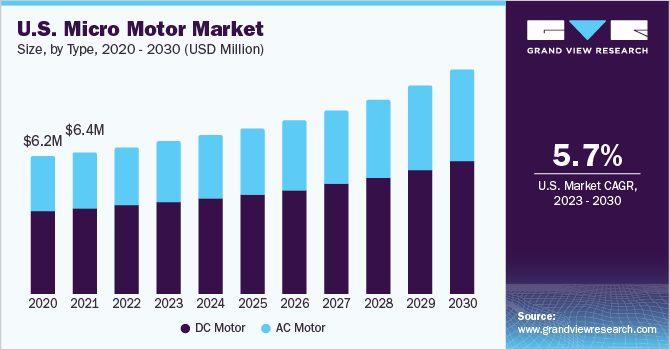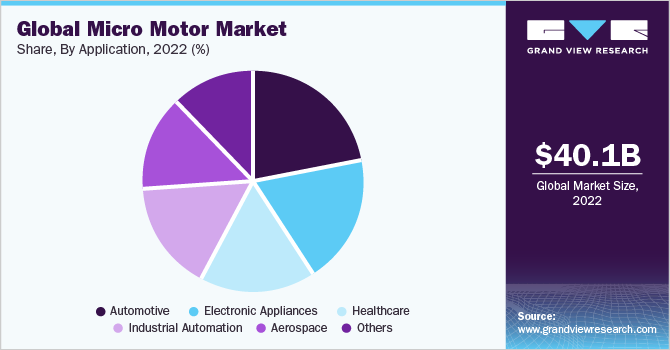
Micro Motor Market Size, Share & Trends Analysis Report By Type (AC Motor, DC Motor), By Technology, By Power Consumption (Below 11V, 12-24 V, 25-48 V), By Application, By Region, And Segment Forecasts, 2023 - 2030
- Report ID: GVR-4-68040-089-7
- Number of Pages: 120
- Format: Electronic (PDF)
- Historical Range: 2017 - 2021
- Industry:Semiconductors & Electronics
Report Overview
The globalmicro motor market sizewas valued atUSD 39.66 billion in 2022and is expected to grow at a compound annual growth rate (CAGR) of 4.8% from 2023 to 2030. The rising advancements in the medical equipment sector significantly contribute to the demand for micromotors. They have several healthcare applications, including medical implants,dental implants, diagnostic tools, and drug delivery equipment. The trend of miniaturization in medical equipment significantly contributes to the growth of the target market. The increasing demand for automation in different processes of industries presents a significant opportunity for the growth of the target market.

Additionally, the growth of the automotive industry is a major driver for the target market. Micromotors are extensively used across different components of an automobile, such as fans, water pumps, wipers, anti-slip brakes, ABS pumps, roofs, clutch actuators, alternators, condensers, and steering wheels, among others.Agriculture equipment, 3D printers, and electronic appliances are some other important applications of micromotors.
The target market faces several challenges, including the high cost of technologies involved in manufacturing micro motors. The cost of developing a niche application micro motor is even higher as it requires significant customization. Additionally, the availability of cheaper local variants of micro motors is impacting the industry players. To overcome the competition from an unorganized market, the organized players are engaging in partnerships with end-use companies such as automotive companies, medical equipment manufacturers, and home appliances manufacturers.
COVID-19 Impact
The majority of industries worldwide were severely impacted during the COVID-19 pandemic. Border closures and strict lockdowns severely affected the supply chains across the globe and increased logistics costs drastically. The supply of micromotors and their components was disrupted due to global supply chain disruptions and the closure of the borders. Several players recorded a lower revenue in 2020 as compared to 2019. However, the revenues started recovering in 2021 and exceeded 2019 revenues in 2022.
The demand for micromotors slowed owing to the closure of the manufacturing facilities. Additionally, slowing automotive and industrial product markets impacted these sectors' demand for micromotors. However, sales of personal care products,power tools, home appliances, and home equipment grew during the pandemic, which increased the demand for micromotors. The demand for them also continued from the medical equipment industry, especially for automated insulin pumps, blood pressure monitors, and glucose monitoring systems.
Type Insights
Based on type, the market is segmented into AC motors and DC motors. The DC motor segment held the largest revenue share of about 61% in 2022 and is expected to grow at a CAGR of 4.6% through the forecast period. DC motors are of two types: brushless and brushed. DC motors have high power density and are used in power tools and personal use appliances such ashair dryers,electric toothbrushes, and electric razors, among others. DC motors are more robust as they have high starting torque, starting and reversing speeds, and are cheaper than AC motors.
The AC motor segment is anticipated to grow at the fastest CAGR of 5.1% over the forecast period. AC motors have better energy efficiency and performance than DC motors. AC motors are suitable for industrial and commercial applications such as compressors, HVAC systems, and pumps. These motors are also in high demand for sophisticated automation and control systems in several industries. AC motors are more dependable owing to the fewer moving parts and simpler designs possible with AC motors.
Technology Insights
Based on technology, the market is segmented into brushless and brushed. The brushed segment dominated with the largest revenue share of about 54% in 2022. It is anticipated to grow at a CAGR of 4.4% during the forecast period. Brushed are easy to install and are priced at a lower value as compared to brushless motors. These motors operate at a speed of about 1,000 to 10,000 rpm. Several automotive systems, such as windshield wipers, power windows, cooling fans, and so on, use a brushed DC motor.
The brushless segment is expected to grow at the fastest CAGR of 4.8% throughout the forecast period. Brushless are more susceptible to damage and have comparatively higher longevity. Brushless motors have a life expectancy of more than 10,000 hours of operation. Brushless motors even require less maintenance and provide higher output per frame size. Although brushless are complex in nature and have high initial costs, their adoption is, however, increasing owing to their longer lifespan as compared to brushed motors.
Power Consumption Insights
Based on power consumption, the market is segmented into below 11 V, 12-24 V, 25-48 V, and above 48 V. Among these, the below 11 V segment dominated the market in 2022, with a revenue share of about 31%. It is anticipated to grow at a CAGR of 4.2% through the forecast period. The low cost and efficiency of these micromotors have led to the increased adoption of several products which can function on low voltage. Low-voltage motors are finding applications in several products, including coffee machines, vacuum cleaners, air purifiers, mixers, food processors, and dryers.
The above 48 V segment is expected to grow at a considerable CAGR of 5.7% throughout the forecast period. Higher power output, energy efficiency, and higher durability of above 48 V micro motors lead to increased demand. These motors can be employed on heavy-duty machinery, unmanned aerial vehicles, autonomous guided vehicles, and aircraft actuation systems. The high torque of these micromotors enables their applications in the high-end transportation and aerospace sector.
Application Insights
Based on application, the market is segmented into automotive, industrial automation, electronic appliances, healthcare, aerospace, and others. The automotive application segment dominated the market in 2022, with a market of about 22%. Micromotors are used in several components of automobiles, such as powered window lifters, power seats, parking brakes, door lock actuators, door mirrors, and several other autonomous systems. Safety mechanisms such as anti-lock braking systems also use micromotors.

医疗应用程序段是预期to register the fastest CAGR of 5.7% during the forecast period. Micromotors are used in portable medical devices, automated insulin pumps, blood pressure monitors, glucose monitoring systems, pocket ECGs, and portable ultrasounds. Micromotors are also used in several medical equipment related to surgery, diagnostics, and drug delivery. The healthcare sector is one of the major application sectors for micromotors as they enable the miniaturization of equipment.
Regional Insights
North America is expected to grow at a significant CAGR of 5.0% during the forecast period. The high growth can be attributed to the presence of several key players and the strong presence of automotive, aerospace, healthcare, and electronic appliances markets in North America. The high demand for personal care equipment and electronic appliances in the region leads to the growing demand for micromotors. Europe is also among the key regional markets owing to the large presence of the automotive industry in the region.

The Asia Pacific region dominated the market in 2022 with a revenue of about 30%. China, Japan, and India are the leading markets in the Asia Pacific region. The increasing adoption of automation across industries and the strong presence of the manufacturing sector in the countries contribute to its leading position. Moreover, Asia Pacific has emerged to be the leading automotive manufacturer in the world, which is significantly contributing to the demand for micromotors for several automotive components such as door locks, mirrors, and windows.
Key Companies & Market Share Insights
The target market is fairly fragmented and comprises several global and regional players. Key players include Mitsuba Corporation, Nidec Corporation, Johnson Electric Holdings Limited, Mabuchi Motor Company Ltd, ABB Ltd., Constar Micromotor Co Ltd, and Buhler Motor GmbH. The players are increasingly focusing on R&D to improve product offerings and reduce costs to gain a competitive edge in the price-sensitive market.
The key players are launching new products or re-introducing improved products in the market. For instance, in February 2023, Mabuchi Motor Co. Ltd. launched three new brushless motors in IS series. The brushless motors can be used in EV vehicles for automated guided vehicles and autonomous mobile robot applications. In December 202, Nidec Corporation launched a new single-phase brushless DC motor for electric fans in another instance. The new single-phase motor is priced at a lower rate than AC motors and has all the advantages of a three-phase brushless motor. Some prominent players in the global micro motor market include:
Mitsuba Corporation
Nidec Corporation
约翰逊厄尔ectric Holdings Limited
Mabuchi Motor Company Ltd
ABB Ltd.
Constar Micromotor Co Ltd
Buhler Motor GmbH
Robert Bosch GmbH
Denso Corporation
Maxon Motor AG
Arc Systems Inc
Siemens AG
Micro Motor Market Report Scope
Report Attribute |
Details |
Market size value in 2023 |
USD 41.33 billion |
Revenue forecast in 2030 |
USD 57.34 billion |
Growth Rate |
CAGR of 4.8% from 2023 to 2030 |
Historic year |
2017 - 2021 |
Base year for estimation |
2022 |
Forecast period |
2023 - 2030 |
Quantitative units |
Revenue in USD billion and CAGR from 2023 to 2030 |
Report coverage |
Revenue forecast, company ranking, competitive landscape, growth factors, and trends |
Segments covered |
Type, technology, power consumption, application, region |
Regional scope |
North America; Europe; Asia Pacific; Latin America; Middle East & Africa |
Country scope |
U.S.; Canada; Germany; France; UK; China; India; Japan; South Korea; Australia; Brazil; Mexico; KSA; UAE; South Africa |
Key companies profiled |
Mitsuba公司;Nidec公司;约翰逊厄尔ectric Holdings Limited; Mabuchi Motor Company Ltd; ABB Ltd.; Constar Micromotor Co Ltd; Buhler Motor GmbH; Robert Bosch GmbH; Denso Corporation; Maxon Motor AG; Arc Systems Inc.; Siemens AG |
Customization scope |
Free report customization (equivalent up to 8 analysts working days) with purchase. Addition or alteration to country, regional & segment scope. |
革命制度党cing and purchase options |
Avail customized purchase options to meet your exact research needs.Explore purchase options |
Global Micro Motor Market Report Segmentation
This report forecasts revenue growths at global, regional, and country levels and provides an analysis of the latest industry trends in each of the sub-segments from 2017 to 2030. For this study, Grand View Research has segmented the global micro motor market report based on type, technology, power consumption, application, and region:
Type Outlook (Revenue, USD Billion, 2017 - 2030)
AC Motor
DC Motor
Technology Outlook (Revenue, USD Billion, 2017 - 2030)
Brushed
Brushless
Power Consumption Outlook (Revenue, USD Billion, 2017 - 2030)
Below 11V
12-24 V
25-48 V
Above 48 V
Application Outlook (Revenue, USD Billion, 2017 - 2030)
Automotive
Industrial Automation
Electronic Appliances
Healthcare
Aerospace
Others
Regional Outlook (Revenue, USD Billion, 2017 - 2030)
North America
U.S.
Canada
Europe
Germany
UK
France
Asia Pacific
China
India
Japan
South Korea
Australia
Latin America
Brazil
Mexico
中东& Africa
KSA
UAE
South Africa
Frequently Asked Questions About This Report
b.The global micro motor market size was estimated at USD 39.66 billion in 2022 and is expected to reach USD 41.33 billion in 2023.
b.The global micro motor market is expected to grow at a compound annual growth rate of 4.8% from 2023 to 2030 to reach USD 57.34 billion by 2030.
b.The DC motor type segment led the global market for micro motors in 2022, accounting for the highest share of about 61%. However, the AC motor type segment is expected to register the fastest CAGR during the forecast period owing to the superior performance and high energy efficiency of AC motors.
b.Some key players operating in the micro motors market include Mitsuba Corporation, Nidec Corporation, Johnson Electric Holdings Limited, Mabuchi Motor Company Ltd, ABB Ltd., Constar Micromotor Co Ltd, and Buhler Motor GmbH.
b.The major factors attributing to the growth of the micro motors market are the growing trend of product/component miniaturization; increasing demand for automated personal care devices; and increasing demand for micro motors from medical equipment industry among others.





